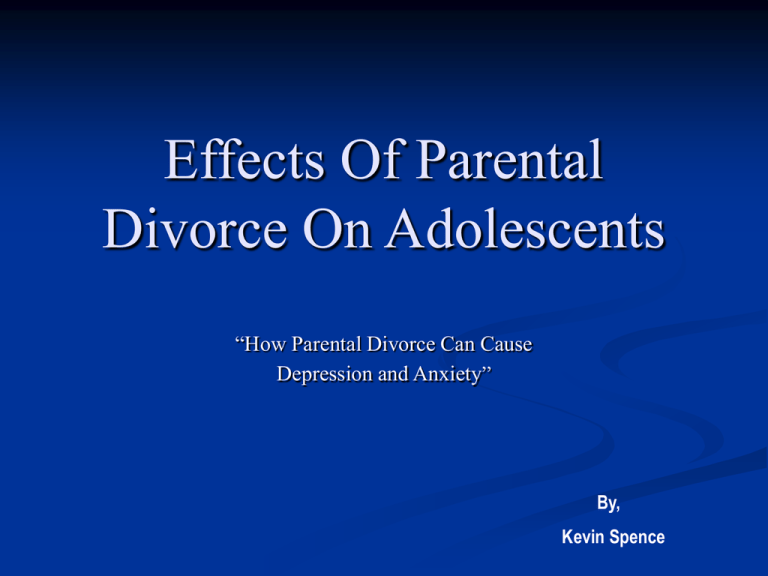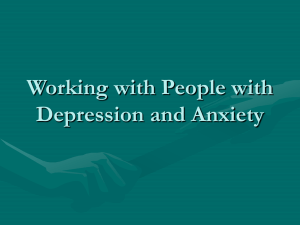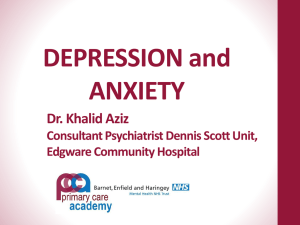Divorce presentation
advertisement

Effects Of Parental Divorce On Adolescents “How Parental Divorce Can Cause Depression and Anxiety” By, Kevin Spence Depression According to the National Institute of Mental Health (NIMH), a “depressive disorder is an illness that involves the body, mood, and thoughts. It affects the way a person eats and sleeps, the way one feels about oneself, and the way one thinks about things.” Also, the NIMH believes that an un-welcomed stress or a change in life patterns, such as stresses at home (parental divorce), can trigger a depressive episode. Anxiety According to the NIMH, an Anxiety disorder is defined as an “illness that fills a persons life with overwhelming anxiety and fear that is chronic, unremitting, and can grow progressively worse. Anxiety can cause a person to be tormented by panic attacks, obsessive thoughts, flashbacks of traumatic events, nightmares, or countless frightening physical symptoms.” Anxiety disorders are generally accompanied by and related to depressive disorders. This may be why Anxiety attacks can occur as a result of a parental divorce. Quick Overview Parental divorce has shown to have many negative effects on the psychological states of adolescents. “It is well documented that adolescents of divorce are at an increased risk of various adjustment problems […] whose problems include depression and anxiety” (Qtd. In Journal of Adolescence). Stressful life events can cause serious psychological changes. Parental divorce is the second highest ranked stressor according to a test on the “Frequency and Severity Ratings on Life Events” done by Jennifer B. Unger, a psychologist for the Journal of Adolescence. Parental divorce was rated a 2.63 out of 3, which is second highest only to “Parental Death” (Unger). These high levels of stress related to parental divorce can be directly associated with psychological illnesses such as Depression and Anxiety. Results from the Nord-Trondelag Health Study (HUNT) show that more than FiftyPercent of adolescents who are experiencing or have experienced a parental divorce, have experienced symptoms of Anxiety or Depression. The HUNT study shows that the internalized emotional distress caused by the divorcing of parents is shown to be the main cause for adolescent depression in most cases. Pre Divorce Conflicts Usually involves the arguing and fighting of the parents Can be most harmful and stressful on adolescents pyschological well-being “Parental distress and discord is significantly associated with internalizing symptoms among adolescent boys and girls” (Qtd. In Journal of Adolescence). “Divorce is the setting off of a chain of negative events and transitions that are casually related to youths’ psychological distress and may be more potent than the physical separation of parents” (Robert H. Aseltine). Stress that this places on adolescents can easily result in the developing of Anxiety and Depression. Post-Divorce Conflicts Comes in three forms: Family Conflict: Proven in Pre-divorce conflict to be harmful. Makes it difficult for Adolescents to adapt to new lifestyle. “Despite the limited contact between custodial and non custodial parents after the divorce, interparental conflict may be a chronic problem in these families, particularly those in which custody arrangements, visitations, and financial support are contentious” (Aseltine). Economic Hardships: Most stress caused by the decreased standard of living. “Financial distress is one of the clearest and most problematic consequences of divorce” (Aseltine). The financial stress is almost always experienced by the mother. Causes psychological distress and disrupted parenting practices due to decrease in standard of living. Decline in standard of living usually involves a “change in neighborhood, change in school, a well developed delinquent culture, and high crime rates” (Qtd. In Journal of Marriage and Family). Living environment, decreased quality in parenting, and lower family income can cause an elevated amount of stress on adolescents which can result in symptoms of Anxiety and Depression. Family Disorganization: Generally involves absence of a parental (usually the father). Studies show it is more important to maintain constant contact with father, than with the mother. “The erosion of parental influence over and involvement in children’s daily lives may make youth’s susceptible to a range of personal problems, including psychological problems such as Anxiety and Depression” (Aseltine). Child needs to be able to look towards both sides for help with certain problems. The problem with a parent not being involved with their child is that they won’t be able to closely monitor the child’s “social activities and educational performance, help solve everyday problems, and reinforce the behavioral standards and disciplinary practices that they normally would” (Qtd. In Journal of Marriage and Family). Gender Issues Males: A small amount of males experience Anxiety or Depression. The effects of parental divorce on males are generally seen in the classroom and in social behaviors Females: There is a relatively high prevalence of Anxiety and Depression in females (41%). This is due to a greater decrease in subjective well-being, a lower increase in self-esteem, and a higher increase in school problems. “It has been described how girls experience more of and/or react more upon life events and stress in adolescence than boys” (Qtd. In Journal of Adolescence). Summary/Treatments Treatments For Anxiety disorders include a combination of medication and specific types of psychotherapy. Medications include antidepressants called selective serotonin reuptake inhibitors (SSRIs). Other antianxiety medications include groups of drugs called benzodiazepines and beta-blockers. If one medication is not effective, many others can be tried. There are two clinically-proven effective forms of psychotherapy used to treat anxiety disorders. They are behavioral therapy and cognitive-behavioral therapy. Behavioral therapy focuses on changing specific actions and uses several techniques to stop unwanted behaviors. In addition to the behavioral therapy techniques, cognitive-behavioral therapy can teach patients to understand and change their thinking patterns so they can react differently to the situations that causes them anxiety. Summary/Treatments Depression can also be treated in two ways, medication or pyschotherapy. There are Three types of Pyschotherapy: Supportive counseling helps ease the pain of depression, and addresses the feelings of hopelessness that accompany depression. Cognitive therapy changes the pessimistic ideas, unrealistic expectations, and overly critical self-evaluations that create depression and sustain it. Cognitive therapy helps the depressed person recognize which life problems are critical, and which are minor. Problem solving therapy changes the areas of the person's life that are creating significant stress, and contributing to the depression. This may require behavioral therapy to develop better coping skills, or Interpersonal therapy, to assist in solving relationship problems. First it is important to understand Antidepressant medication does not cure depression, it only helps you to feel better by controlling certain symptoms Some Medications include: Elavil Luvox (SSRI). Marplan (MAOI). Nardil (MAOI). Prozac (SSRI). Paxil (SSRI) Summary/Treatments Parental Divorce can cause an intolerable amount of stress on an adolescent. These stresses can cause symptoms of Anxiety and Depression. There are treatments available for both Anxiety and Depression. It is important to keep the best interests of the adolescents who are experiencing the divorce. After the divorce it is important that both parents play their part in maintaining a healthy relationship with their children to help them adapt to the new lifestyle.








